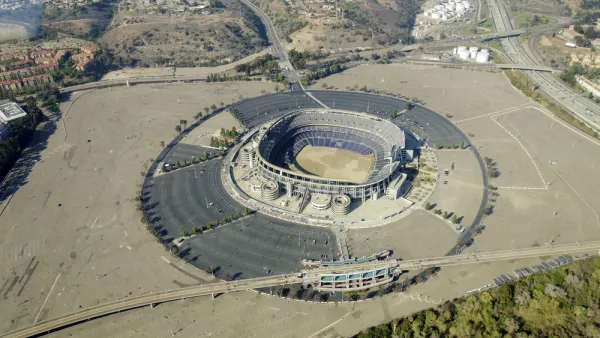Studies show building NFL stadiums drain tax revenues and don't boost local economies. What about NFL teams themselves? Land use attorney (and football fan) Bill Adams argues that they rob support from local college teams and local economies.
It's is not impossible for colleges to win or have great attendance with NFL teams next door. It's just harder. That's not good for the college teams, the college's educational and research programs, or the local economies that benefit from the college's presence, argues attorney and football fan Bill Adams.
Using his own city's (San Diego) NCAA and NFL football teams as examples, the latter of which maybe headed to Los Angeles, he cites several studies and articles to make a step by step case that: 1) colleges are important to local economies—much more so than NFL teams; 2) winning college football programs boost the number and quality of new student applications; 3) more and better new student applications result in greater funding and growth of the college; 4) the growth of the college increases the benefit to the local economy; 5) NFL teams compete with local colleges for football fans resulting in diminished attendance at college games; 6) diminished attendance means diminished support for college football; 7) diminished support means diminished success over the long haul; and 8) diminished football success reduces the number and quality of new student applications.
Obviously, a college's football program can still be successful with the NFL in town because a college can be successful without any football program. However, the presence of an NFL team is a negative pressure on a college's football program and, in turn, the college itself. It's an additional obstacle that some programs can overcome and some cannot. Therefore, if you are a football fan who likes both your NFL team and your college team, maybe its time to make a choice.
FULL STORY: Are the NFL Chargers causing the NCAA Aztecs to lose?

National Parks Layoffs Will Cause Communities to Lose Billions
Thousands of essential park workers were laid off this week, just before the busy spring break season.

Retro-silient?: America’s First “Eco-burb,” The Woodlands Turns 50
A master-planned community north of Houston offers lessons on green infrastructure and resilient design, but falls short of its founder’s lofty affordability and walkability goals.

Delivering for America Plan Will Downgrade Mail Service in at Least 49.5 Percent of Zip Codes
Republican and Democrat lawmakers criticize the plan for its disproportionate negative impact on rural communities.

Test News Post 1
This is a summary

Test News Headline 46
Test for the image on the front page.

Balancing Bombs and Butterflies: How the National Guard Protects a Rare Species
The National Guard at Fort Indiantown Gap uses GIS technology and land management strategies to balance military training with conservation efforts, ensuring the survival of the rare eastern regal fritillary butterfly.
Urban Design for Planners 1: Software Tools
This six-course series explores essential urban design concepts using open source software and equips planners with the tools they need to participate fully in the urban design process.
Planning for Universal Design
Learn the tools for implementing Universal Design in planning regulations.
EMC Planning Group, Inc.
Planetizen
Planetizen
Mpact (formerly Rail~Volution)
Great Falls Development Authority, Inc.
HUDs Office of Policy Development and Research
NYU Wagner Graduate School of Public Service





























